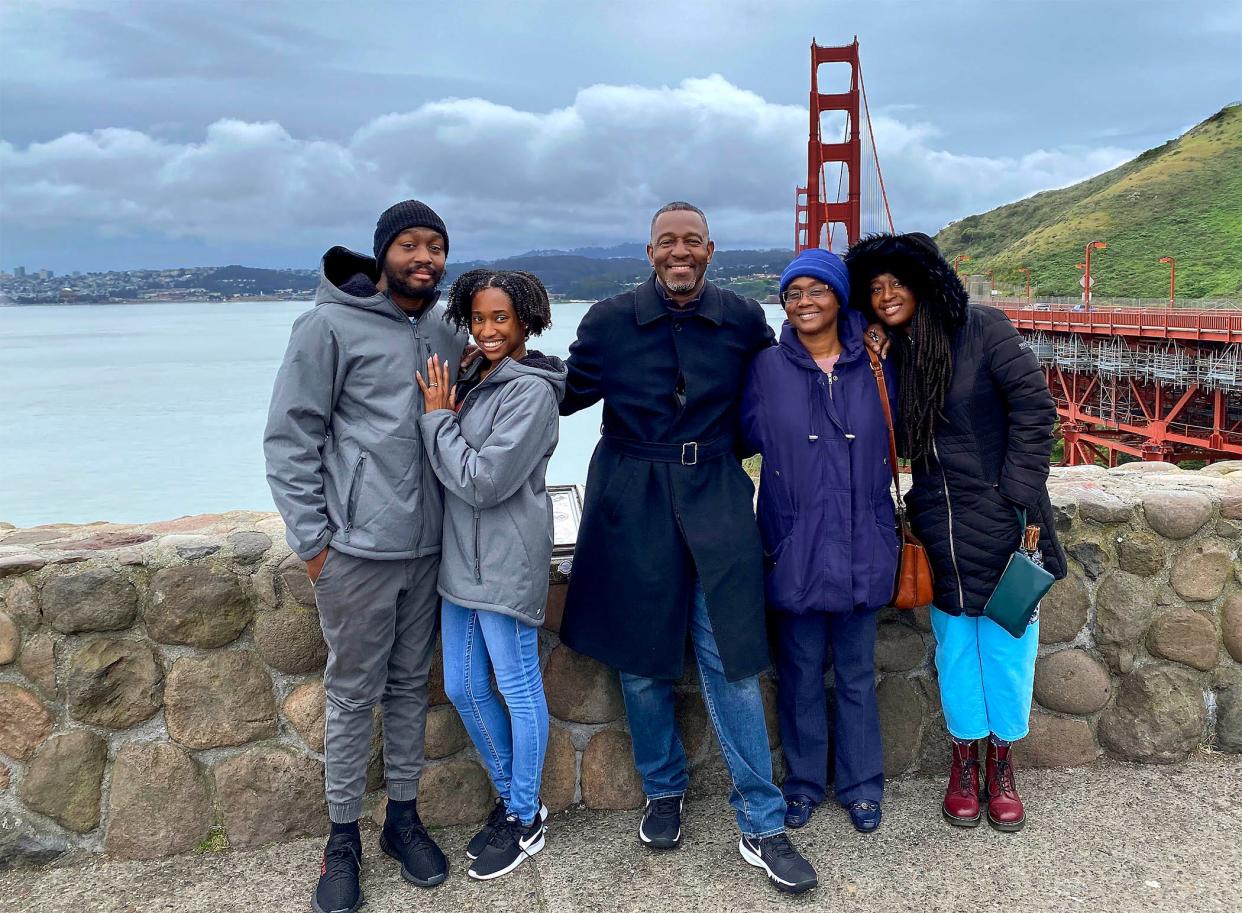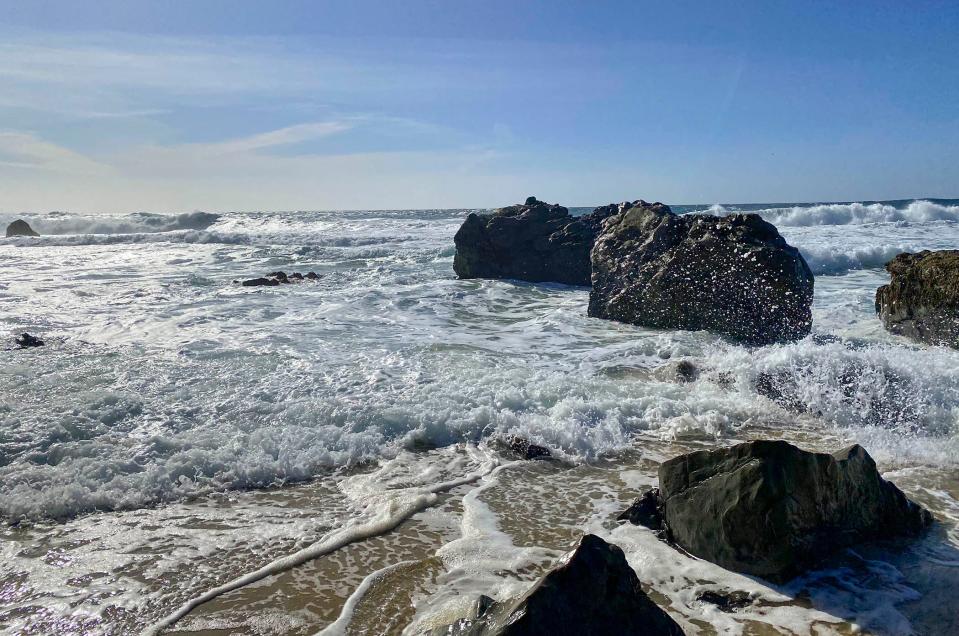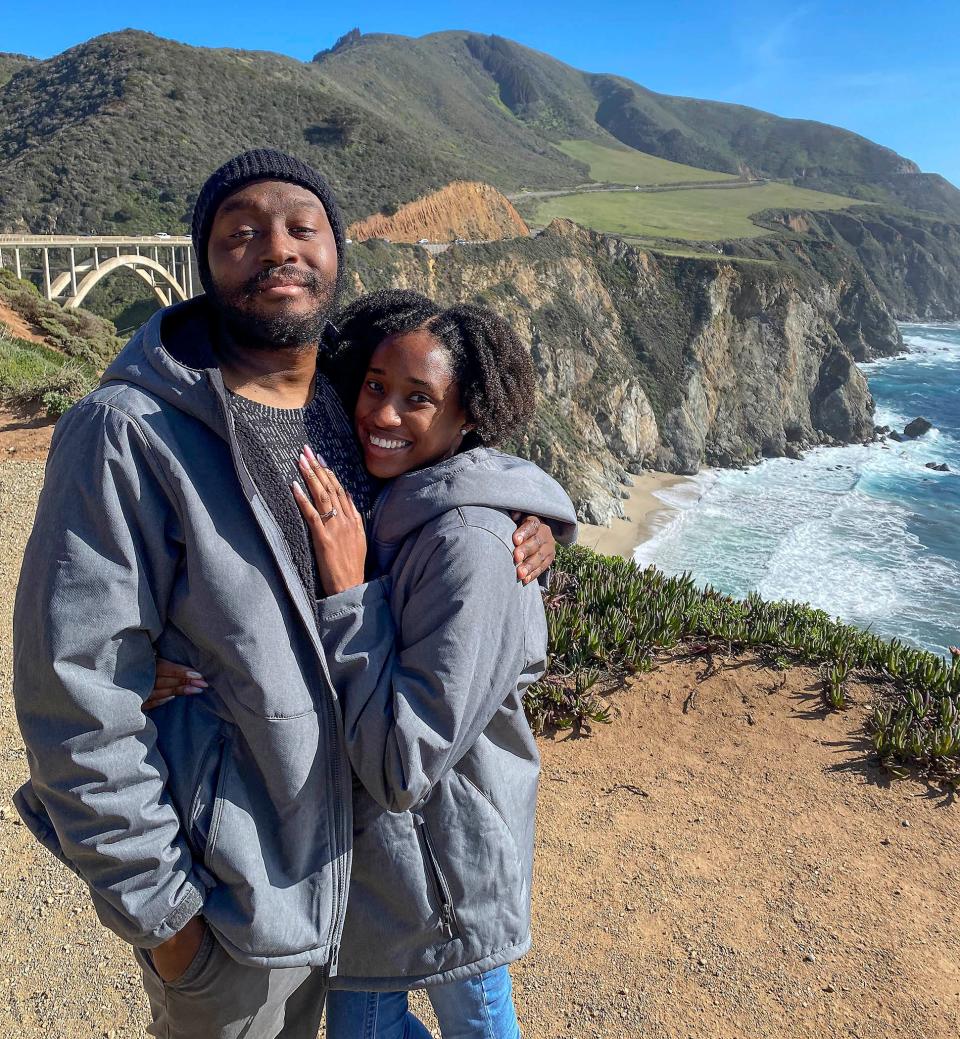Encounter on a train stains beautiful setting with ugly reality

The old man seemed to need some help.
Using his wheelchair as a sort of walker, he had very slowly made his way onto the train with me, my family and others looking to go from the Bay Area Rapid Transit System's Powell Street Station in downtown San Francisco to San Francisco International Airport.
We had all briefly gotten on the wrong train and needed to exit and wait for the next one.
I thought to go to the man to help him because he was the last of us to get off the train.
I had no way of knowing that, in 20 minutes, I'd be calling for police to get this old man away from me and my family and to stop him from hurling racist invective at us.
A good place for a spring vacation
My wife, Shelia, and I spent the first three and half years of our marriage in California in the early 1990s. We moved there a day after our wedding, which was 10 days after I had graduated from college.
We both grew up in South Carolina and hadn't traveled extensively. California's mountains, its sunshine, diversity and expanse were a wonder.
Since those early days, California has held a special place in our hearts. We took our children, Ashley and Wayne, on a cross-country drive to California when they were teens. Years later, we talked up the state to our son's fiancée, Erica.
We wanted to show Erica the Bay Area, and so, with the coronavirus still limiting international travel, we chose it as a good place for a spring vacation.
I meticulously planned out our trip and the things we'd do: see the Golden Gate Bridge, hit Chinatown, ride on a cable car.
Erica wanted to see Highway 1 and the Bixby Creek Bridge, made famous by the HBO series "Big Little Lies," and so my plan included renting an SUV for a couple days so we could drive down the coast.
That's why we were heading to the airport. We were going to pick up the rental and head first to Watsonville, where an old friend and her husband had offered us a special, unplanned treat: an aerial view of the Monterey area in his small airplane.
More: COVID-19 ups private plane use and the ire of those living near Palm Beach International
Flights: JetBlue nonstop flight between LAX and West Palm Beach to stop temporarily

When the BART train to the airport finally pulled into the Powell Street Station, we were eager to board, eager for the thrilling day ahead.
We got on the train and chose a section where we could all sit together. I sat next to my wife. My son sat across from us with Erica, and Ashley sat in a seat across the aisle from them.
The old man rolled his wheelchair onto the train and sat across from Ashley.
There were other places where he could have chosen to sit, but he came to the area where we were sitting.
Just before the doors closed, the man looked at us and chuckled.
"This must be the section for Blacks," he said.
I saw Ashley's eyebrows rise. We all looked at each other. I knew I wasn't the only one thinking: "Did he just say what it sounded like he said?"
Silently and collectively, we chose to ignore him.
The old man wasn't done.
"My skin is almost as dark as yours," he said.
I looked at the man and noticed then the bottle in his wheelchair basket, which he retrieved for a drink.
There was no questioning the man's racial animus now.
He was Asian American, diminutive, old, drunk. He wore a black and gold veteran's cap.
I caught my family's eye, cupped my right hand and surreptitiously tipped it a couple times to tell them that the man was drunk.
Ignoring the man wasn't working.
He raised his voice.
"Hey," he said. "Hey! What the f- are you doing in California?"
When we didn't answer, he answered his own question.
"Having a good time, I guess," he said.
He wouldn't stop. "Hey!" he snarled, challenging us. "What? What? Hey!"
Ashley turned her knees in our direction so her body faced us and not him. Erica shrank back toward the window, away from the direction of the man.
Perhaps sensing this, Wayne turned to face the man. I know my son, and I know when he's angry.
Erica knows him, too. She placed a restraining hand on his forearm and then patted him on his thigh. In unison, we all quietly said, "No, no."
Wayne looked up and took a deep breath before turning in Erica's direction and away from the old man.
Several stops later, after the old man had twice lost control of his wheelchair, the train stopped at a station and remained for a few minutes with its doors open.
I noticed two police officers on the platform. Getting their attention, I motioned them toward us and pointed to the old man.
As the officers came onboard, I told them the man had racially abused us, was drinking and had lost control of his wheelchair.
The officers rolled the man off the train, and, a minute or two later, it pulled away.
I looked at the stricken and angry faces of my family.
My planning had put us in California. My planning had put us on that train.
"I'm very sorry," I told them. "We didn't deserve that."
No one said anything for a while. Then, Wayne pointed to his heart and said: "Drunk or not, for him to say those things, they had to be in there."
"I agree," I said. "I completely agree."
We were mostly silent as we reached the airport station.
"Mr. Washington," Erica said. "Would it be OK if we didn't ride the train again? I don't feel safe on it."
"Of course," I said. "I understand."
A cloud that hangs overhead
As we walked toward the rental car counter, I admitted to my family: "I ain't gonna lie. It takes me a while to get past these things. I try to forget them, but it takes me a minute."
The old man had pulled a cloud over us.
To be Black is to know there's a chance that, on any given day, you'll be a receptacle for someone else's bigotry and bile. Just ... 'cause.
It doesn't happen every day. It doesn't happen most days. But it can happen on any day.
Politicians feed the racist beast, knocking the qualifications and credibility of even ridiculously qualified Black office-seekers or appointees and confirming for some white people that, no, their children really don't need to learn about the nation's history of racism if it'll make them even a little uncomfortable.
Being a bigot now isn't simply vile and uncouth; it's just a refusal to be "politically correct" or "woke."
There's a bigotry bash going on, and the price of admittance is the absence of Black skin.
In my mind, the old man on the BART train joined a list of louts who blithely add their rocks of racism to the pail of bigotry Black people are forced to tote.
There was the white, female teacher at my daughter's elementary school in Tampa who told us she was struggling in kindergarten because she was "culturally deprived."
When I asked her what she meant by that term, she said children can be culturally deprived if they live in a home where books and learning aren't or can't be the top priority.
I told the woman Ashley was simply very young and shy.
"I'm a journalist, and my wife works at a bank," I told her. "Our home is filled with books. I assure you, there's nothing about Ashley's culture that has deprived her."
Ashley now has a master's degree in clinical microbiology, and, somehow getting past all of that cultural deprivation, works as a laboratory scientist in a local hospital in West Palm Beach.
That teacher was later joined on the lout list by the old white man in South Carolina who stopped my son while he was riding his bike with his friend in our neighborhood to ask him if he lived there.
Wayne rode home instead of answering. When I went to the man and confronted him, he refused to apologize and eventually said there were "too many" of us living in the neighborhood.
When I contacted his boss, the man gave him a choice: apologize or quit. He quit.
Baptism of bigotry: Wellington confrontation renews memories of racist encounter
More: Five things I learned in my search for my roots
A white male newspaper editor, refusing to hire me for a job I sought, told me bluntly: "Your career has been turbo-charged by the dearth of African Americans in this business."
With that one statement, he not only declined to hire me, he sought to belittle the work I had done to prepare for a career in journalism and the work I had done once I entered the profession.
A young white man, seeing my family and me in a Walmart parking lot in Cheyenne, Wyoming, threw up a Nazi salute in our direction. He and the white guy he was with laughed as they walked to the store.
Then there was the time a young, white female security guard followed Wayne and me in a Las Vegas mall store so closely, so obviously and for such a long time, we wondered what was wrong.
Wayne, then 13, turned to the young woman.
"Why are you following us?" he asked. "Did we do something wrong?"
That question captures some of what happens to Black people when random racism rears its head. We actually wonder if we did something wrong. Could it not be racism and something else?

It shouldn't be on us
Contrary to the thinking of some, we don't always jump to racism. Often, we look to see if there is some other explanation for the treatment.
Sadly, infuriatingly, the answer to that question is: if it looks like racism, smells like racism, sounds like racism, it's a safe bet it's racism.
The old man on the BART train left me feeling powerless and angry. I reproached myself. Should I have punched him? Why did I let him curse like that in front of my family? Why didn't I move?
I know it shouldn't be on us to take action to avoid being the victims of racism.
If we hadn't stopped Wayne from responding — and if the man's provocations had led to a physical confrontation — what are the chances that Wayne would have been believed when he argued that the man was verbally abusing his family? Might Wayne have simply become yet another person participating in this wave of attacks on Asian Americans?
My family and I know it would have been dangerous to bet that we'd be believed.
We worked to get past the ugliness of the old man on the train.

California helped. Ashley and I accepted the offer of an aerial view of Monterey and were spellbound. Waves crashed into huge rocks. Mountains dove into the sea.
We all returned to Highway 1 the next day and took lots of tourist pictures of that fantastic stretch of coastline. Erica got her pictures near Bixby Creek Bridge.
I had forgotten how the Pacific Ocean roars. That majestic sound can drown out just about anything.
For a little while, anyway.
This article originally appeared on Palm Beach Post: California vacation was a family getaway until a racist rant began

